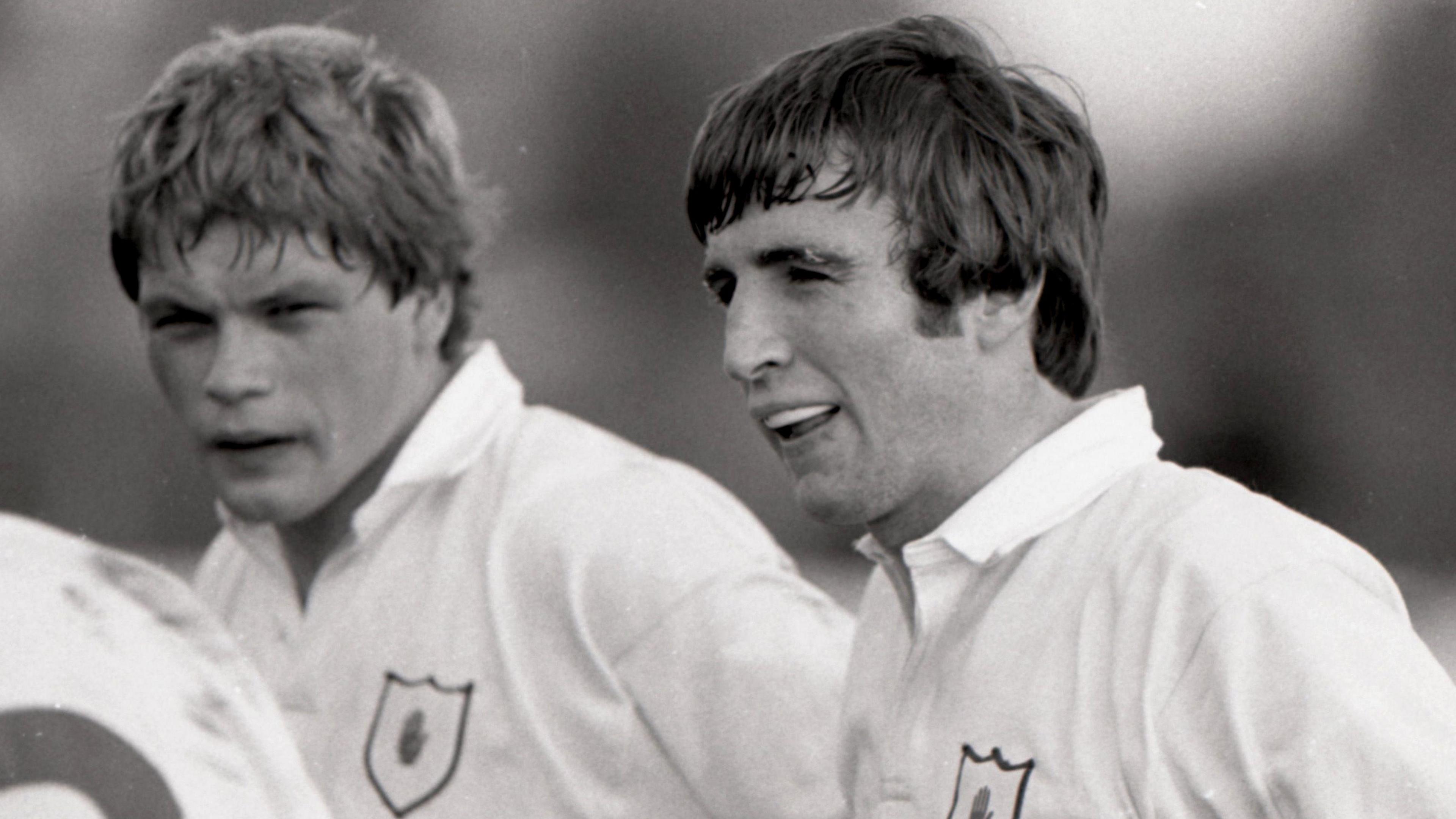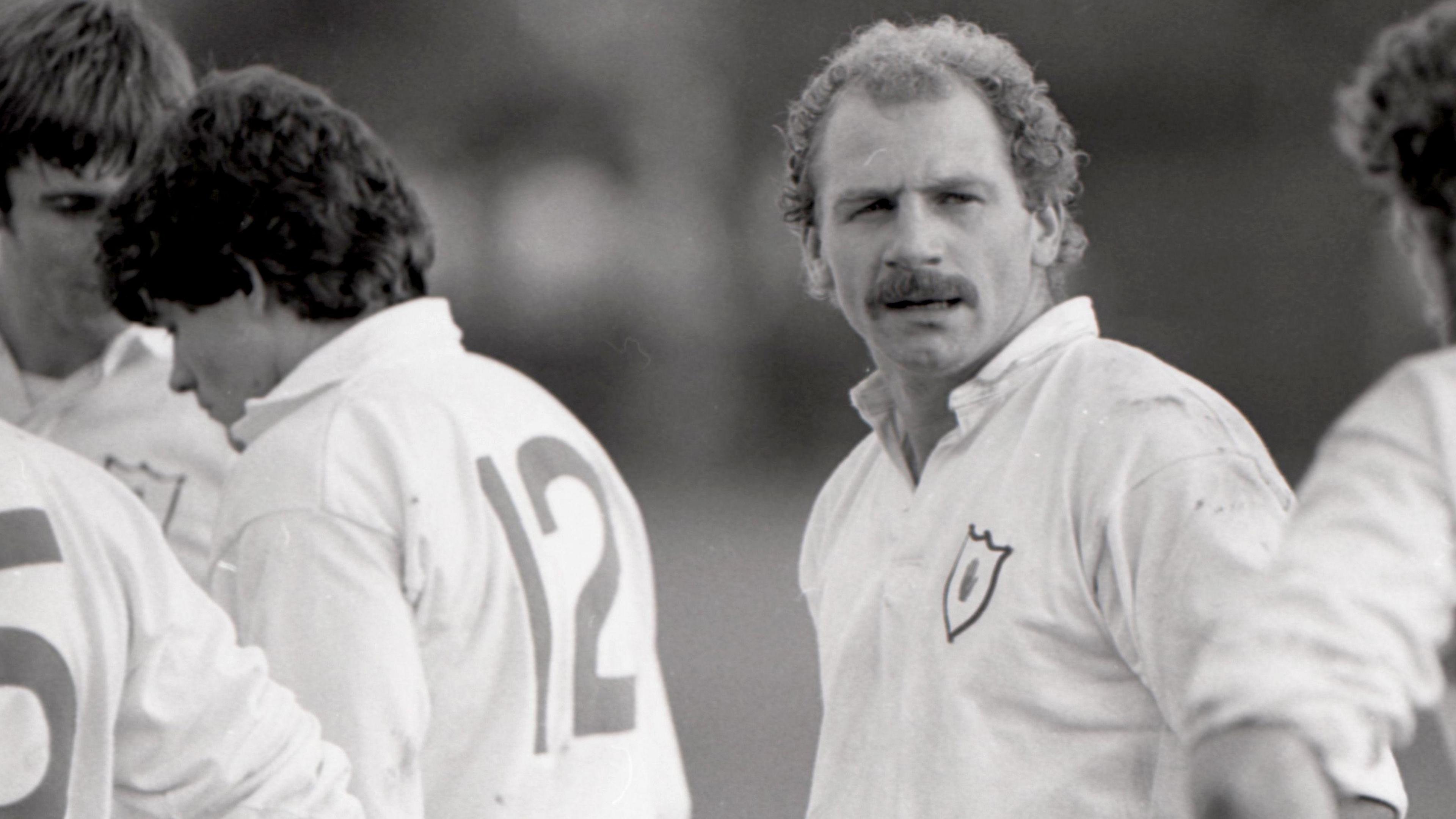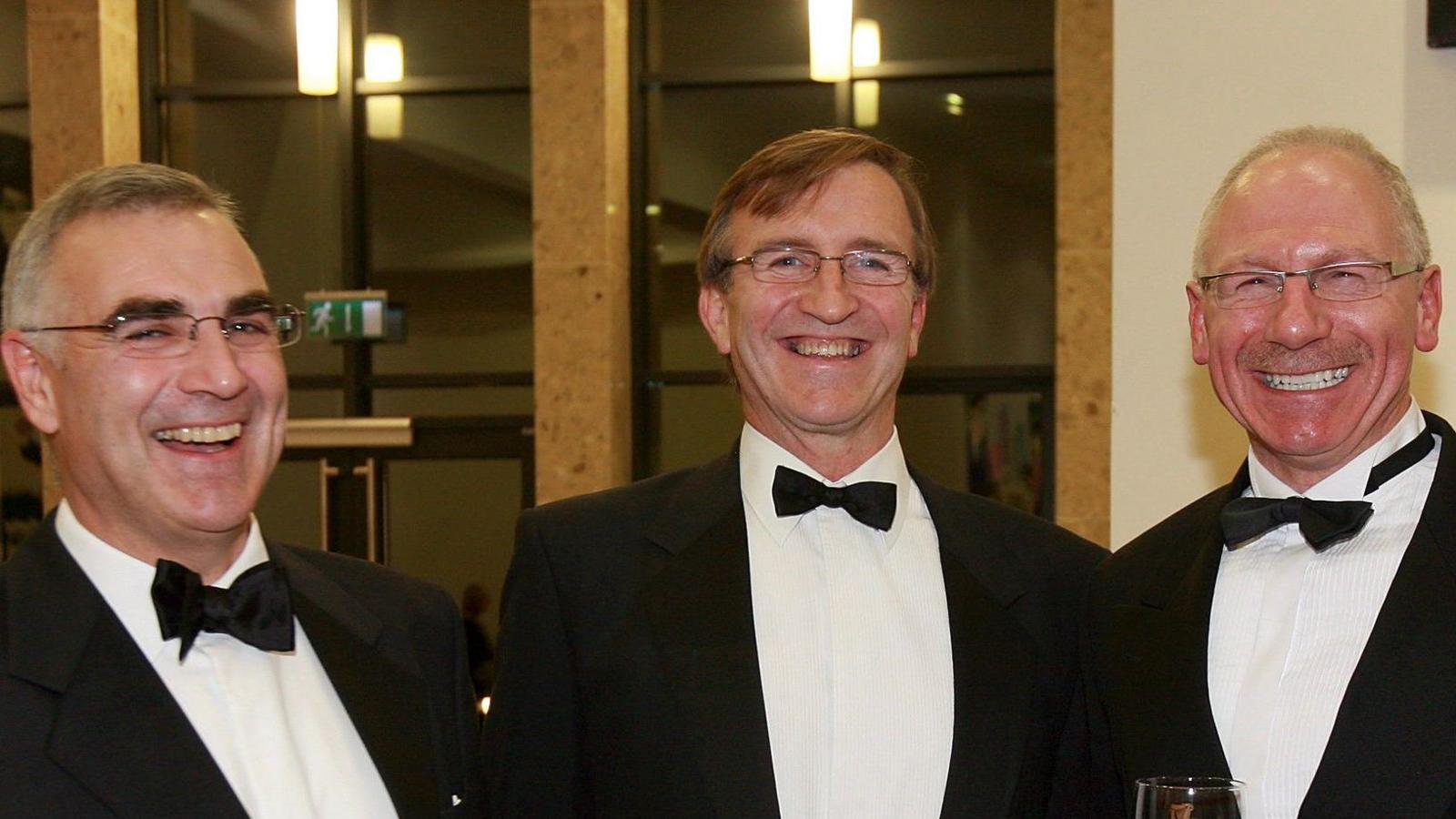Beating Grand Slam Wallabies was Ulster's 'turning point'

Trevor Ringland and David Irwin helped Ulster beat the Wallabies at Ravenhill in 1984
- Published
As Australia arrived in Dublin this week for Saturday's Test match against Ireland, they did so with their 'Grand Slam' dreams already dashed for another tour.
After wins against Wales and England to open their month in the northern hemisphere, Joe Schmidt's side were beaten by Scotland at Murrayfield on Sunday to end hopes of a clean sweep of the home unions this November.
Instead, the legendary Wallabies of 1984 continue to stand alone. For many, the Ulster side who beat them 15-13 at Ravenhill 40 years ago this month do too.
While momentum built slowly during the province's European Cup triumph of 1999, the wet and windy night in Belfast four decades ago is widely considered to be the greatest standalone result in the side's history.
Furthermore, two legends of the team, David Irwin and Nigel Carr, describe the game as the "turning point" that kickstarted a decade of dominance in Irish rugby.
O'Connell praises 'fantastic' Schmidt before reunion
- Published27 November 2024
All you need to know about Ireland v Australia
- Published24 November 2024
Entering the autumn of 1984, Ulster had not won the Irish interprovincial championship outright since 1977, the days of Willie John McBride and Mike Gibson receding ever further into the distance.
As Ireland were whitewashed in the Five Nations that year, the northern province had provided only a smattering of representation.
Their coach Jimmy Davidson, however, was already thinking big.
Having brought through the bulk of the Ulster team at Queen's University Belfast, the man his captain Irwin describes as "light years ahead of most other coaches at the time", had set his sights on a touring scalp.
"Jimmy always had a vision for Ulster which was limited more by the infrastructure," said Carr, who would go on to earn 12 international caps before his career was cruelly cut short by injury caused by an IRA bomb.
"There was the interprovincial championship but there weren't many opportunities to demonstrate just how good a side you were, the opportunities now that the current Ulster side have to set your mark against sides from England, Scotland, Italy, Wales and France.
"Jimmy had the aspiration, but those opportunities were few and far between."
His focus, as such, was on the visit of an Australia side who, despite having beaten Ireland 16-9 in Dublin only four days prior, would still field the likes of Michael Lynagh, Andy McIntyre and Matt Burke from the start in Belfast with David Campese coming off the bench.
The belief of their coach, who had taken over in 1983, spread through his players.
"I think he thought we needed to start beating sides from outside the UK to be recognised," remembered Irwin, who had never previously captained a side at any level before being made provincial skipper.
"Australia obviously was the first one that came along in his time with the Ulster team.
"I remember the build-up and being fairly confident that we could at least give them a good game and potentially beat them, even though they were a very, very good Australian side."

Nigel Carr was making his return to the Ulster side against Australia after two years spoiled by injury
The game, played on 14 November 1984, was not a classic given the conditions but saw Ulster lead 6-3 at half-time before they fell 13-6 behind thanks to a pair of tries from Australian winger Peter Grigg.
The boot of Ian Brown brought Ulster back to within a point with the game best remembered for its dramatic conclusion, the winning penalty from Ulster full-back Phillip Rainey from more than 45 metres out.
"It really was a herculean kick when you think about what a wet day it was, playing with a leather ball that had been soaking up the rain, the distance, near the end of the game," said Carr.
"Chipper [Rainey] is very modest about all of that, and Ian Brown had kicked points too, but it was a mammoth kick and there'd be very few around at that time, or even since, who would have made it.
"Rightfully it has come to epitomise the spirit of that side."
For Rainey, who would go on to win his sole Irish cap against the All Blacks in 1989 after Davidson became national coach, it was a wholly deserving moment in the spotlight.
"Nowadays, Chipper would have had 30 caps the way they give them out," said Irwin, who himself won 25 Irish caps and toured with the British and Irish Lions in 1983.
"Rab Brady was the same, he was man of the match in that Australia game and he'd sat on the bench for Ireland without ever getting a cap back then [he was retrospectively awarded a cap last year for an appearance against Japan in 1985].
"The old adage was that it was harder to get off the Ireland team than to get on it at that time."
Irwin feels cases such as those ensured the Ulster team of the time always took the field "with a point to prove", with the famous win over Australia providing the momentum for a run of 10 straight outright or shared interprovincial titles and a period of increased international representation from the 1985 Triple Crown season with Carr one of those to debut in green.
"[Beating Australia] certainly gave us a lot of confidence. Off the back of that we beat Fiji, we beat Samoa, we beat Canada, we beat Italy, a lot of strong provincial sides," said Irwin.
"It opened our eyes to what we'd said all along, that we were capable of beating anyone on our day."

Philip Rainey, David Irwin and Nigel Carr at the team's reunion in 2009
Irwin is a prime example of how difficult it is to compare teams across eras. A doctor who was often working 100-hour weeks during the early years of his rugby career - before playing Australia in 1981 he sat medical exams in the morning before receiving a police escort to Dublin in time for kick-off - he took great pride in captaining the side but had to juggle the role among other responsibilities.
But even four decades on, when it came time to organise a reunion to mark 40 years since their signature achievement this month, it was still the skipper taking up the reins.
For Carr, the get together provided a reminder not of achievements on the field but of bonds off it.
"I played with Phillip Matthews at school, at Queen's, in Ulster teams and Ireland teams. He's lived in Dublin since the mid-'80s but whenever you see him, it's like you saw him last week.
"I don't see those boys desperately frequently as we all get older, so it was great for Davy to organise that and us to get together.
"That's the most enduring thing from it all, the camaraderie and friendships that were forged in those matches."